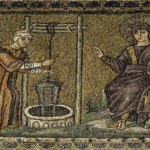We run our website the way we wished the whole internet worked: we provide high quality original content with no ads. We are funded solely by your direct support. Please consider supporting this project.

God is Flexible: Romans 9, Part 4
As we continue this series on Romans 9, [Here’s the link to the first post in the series.] today we will look at the famous potter/clay analogy. Most tend to interpret the potter and clay image as supporting the deterministic view of God. But in fact, it teaches just the opposite. This is the fifth argument of six against the deterministic view of Romans 9.
Argument #5: The Flexible Potter and the Willing Clay
If we read Romans 9 in the light of its Old Testament background, Paul’s analogy of a potter working with clay doesn’t imply that the potter unilaterally decides everything, as the deterministic interpretation suggests. Indeed, in the Old Testament passage that makes the most use of the potter/clay analogy, it has the exact opposite meaning.
AsIn Jeremiah 18 the Lord showed Jeremiah a potter who was working on a vessel that didn’t turn out right. So the potter revised his plan and formed a different kind of pot out of it (Jer 18:1-4). In the same way, the Lord said, since he is the potter and Israel is the clay, he has the right and is willing to “change his mind” about his plans for Israel if they will simply repent (Jer 18:4-11). Indeed, the Lord announced that whenever he’s going to judge a nation, he is willing to change his mind if the nation repents. Conversely, whenever God announces that he’s going to bless a nation, he will change his mind if that nation turns away from him. In other words, the point of the potter/clay analogy is not God’s unilateral control, but God’s willingness and right to change his plans in response to changing hearts.
The passage fits perfectly with the point Paul is making in Romans 9. While some individual Jews had accepted Jesus as the Messiah, the nation as a whole had rejected Jesus, and thus rejected God’s purpose for themselves (cf. Lk 7:30). Hence, though God had previously blessed Israel, he was now changing his mind about them and was hardening them. Ironically, and shockingly, the Jews were finding themselves in the same position as their old nemesis Pharaoh. He had hardened his heart toward God, so God responded by hardening him further in order to raise him up to further his own sovereign purposes (Rom 9: 17). So too, Paul was arguing, God was now hardening the Jews in their self-chosen unbelief to further his sovereign purposes. He was going to use their rebellion to do what he had always hoped their obedience would do: namely, bring the non-Jewish world into a relationship with him (Rom 11:11-12).
Even here, however, the sovereign potter remains flexible. If the Jews will abandon their unbelief – clearly God’s hardening is not determinative or irrevocable – the potter will once again refashion his plan and graft them in. Conversely, if the Gentiles ever abandon their belief and become prideful – clearly God’s mercy is not determinative or irrevocable – the potter will once again refashion his plan for them and cut them off (Rom 11:12-25).
In any case, we see that the point of the potter/clay analogy is the opposite of what the deterministic interpretation would have us believe. Paul’s point is that the sovereign potter has the right to revise his plans in response to the clay, which is exactly what God was doing to the nation of Israel. And, however arbitrary his revisions may appear to Jews who trust in their nationality or good works, they are in fact perfectly wise and just revisions.
This sheds light on why Paul responds to the charge that God is unfair by quoting God as saying, “I will have mercy on whom I have mercy” (9:14, cf. 18). He is not suggesting that God gives mercy or hardens people without any consideration of the choices people make. To the contrary, as has always been the case, the people God chooses to have mercy on are those who have faith, whether they are Jews or Gentiles. And the people God chooses to harden are those who don’t “strive for [righteousness] on the basis of faith, but as if it were based on works” (vs. 30–32). But to Jews who insisted that God must choose people based on their nationality or works, God’s right to have mercy on whomever he wishes – even if they have nothing other than faith going for them – needed to be emphasized.
It is also significant to note the original context of the Old Testament quote Paul is giving. The Jews had just turned away from God to worship idols while Moses was receiving the Ten Commandments on Mt. Sinai – the terms of the covenant God was initiating with them (Ex 32:1-6). God responded by telling Moses he was planning on destroying the Israelites and starting over with Moses alone (Ex 32:9-10). Because of Moses’ intercession, however, the Lord changed his mind and gave those who were willing a chance to repent (Ex 32:14-35). The flexible potter refashioned his plan.
In a tender dialogue between God and Moses that followed this episode, the Lord allowed Moses to behold some of his glory, telling him “I will have mercy on whom I will have mercy” (Ex 33:19). The Lord was saying that, to people of faith like Moses, he gives mercy, while to people like the Jews who rebelled – and like Pharaoh – he gives judgment. By choosing to have faith or to rebel against God, individuals decide which they will receive. They determine whether God will fashion them into a vessel of mercy or a vessel prepared for destruction (Rom 9:21-23).
This also explains why Paul says that God “endured with much patience” the vessels he was preparing for destruction (Rom. 9:22). Why would God have to “endure with much patience” rebellious people if he was the one making them rebellious in the first place? Why would he go on to say, “All day long I have held out my hands to a disobedient and contrary people” (10:21, quoting Isa. 65:2) if he was the one molding them to be disobedient? And why would a God of love intentionally fashion people to rebel against him and bring destruction on themselves in the first place?
In point of fact, the potter endures with much patience the vessels that are being prepared for destruction because it was not his original will to fashion these people in this direction. He would love for all “disobedient and contrary people” to come to him, and so he is patient with them. But so long as they persist in their unbelief, they are clay that can only be fashioned into a vessel fit for destruction.
Image by vandan desai via Flickr.
Category: General
Tags: Determinism, Israel, Open Theism, Potter and Clay, Predestination, Romans 9
Topics: Providence, Predestination and Free Will
Verse: Romans 9
Related Reading

What is the significance of Deuteronomy 30:19?
After establishing the terms of the covenant he was entering into with Israel, the Lord says, “I call heaven and earth to witness against you today that I have set before you life and death, blessings and curses. Choose life so that you and your descendants may live.” This passage represents the most fundamental motif…

Jesus and the “Favored Nation”
Nationalism lies at the heart of the Old Testament narrative. This concept is intimately wrapped up with the law-oriented covenant God made with the Israelites at Mount Sinai, for at the heart of this covenant is the promise that obedience would bring national security while disobedience would bring national disaster (Deut. 27-28). What we shall…

Last Minute Preparations
We’re all busy here at ReKnew making last minute preparations for the Open2013 conference here in St. Paul, MN. It’s our first ever event of this kind and there’s a nervous energy and anticipation. I wonder if you’ll hold this up in prayer if you weren’t able to join us? We have a last minute…

What is the significance of Isaiah 38:1–5?
God tells Hezekiah “you shall die: you shall not recover” (vs. 1). Hezekiah pleads with God and God decides to “add fifteen years” to his life. As we noted concerning 2 Kings 20:1–5, if God foreknew that he wasn’t going to end Hezekiah’s life, his declaration that he intended to do so and his decision…

What is the significance of 1 Kings 21:27–29?
Because of Ahab’s great sin the Lord tells him, “I will bring disaster on you; I will consume you…” (vs. 21). Ahab repents and the Lord responds by telling his messenger prophet, “Have you seen how Ahab has humbled himself before me? Because he has humbled himself before me, I will not bring the disaster…

What is the significance of 1 Chronicles 21:15?
“And God sent an angel to Jerusalem to destroy it; but when he was about to destroy it, the Lord took note and relented concerning the calamity; he said to the destroying angel, ‘Enough! Stay your hand.’” This powerful passage tells us why God sent the angel and why he changed his mind. If God…
